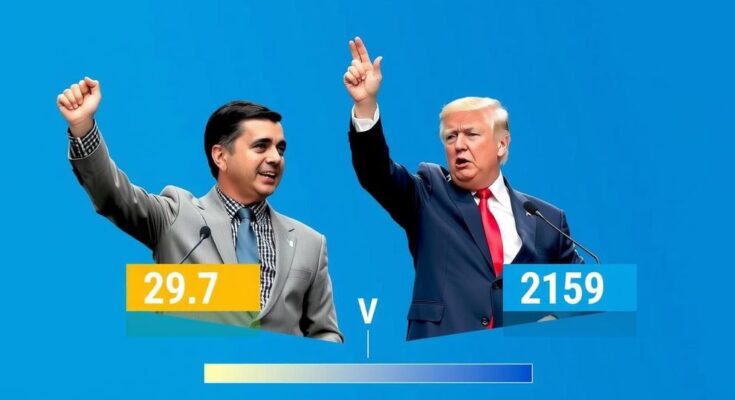Uruguay’s presidential runoff on Sunday features a tight contest between Álvaro Delgado of the National Party and Yamandú Orsi of the leftist Broad Front. Analysts suggest the election reflects voter frustration over issues such as rising crime and income inequality. Polls indicate a near tie, highlighting a political climate of indecision among voters, while both candidates pledge to work together if elected. The election’s outcome could shape the country’s future amid a backdrop of economic growth and social challenges.
Uruguay’s presidential runoff has transitioned from a typically mundane election into a fiercely contested race. On Sunday, voters returned to the polls to select their next leader among Álvaro Delgado of the ruling National Party and Yamandú Orsi from the leftist Broad Front coalition. Both candidates are vying for support amid a backdrop of social concerns, including income inequality and rising violent crime. The prospect of forming alliances in Congress, which remains closely contested, adds another layer of complexity to the election outcome, with polls indicating a near tie between Delgado and Orsi.
Delgado, a seasoned figure in the National Party and current Secretary of the Presidency, aims to carry forth the legacy of President Luis Lacalle Pou, advocating for continuity in governance. He committed to pro-business policies while addressing security issues through a tough-on-crime stance. In contrast, Orsi’s campaign reflects the aspirations of the left, seeking a more socially considerate approach without advocating for radical changes, although he carries the historical baggage of the Broad Front’s past governance.
The Oct. 27 first round of voting resulted in Delgado obtaining 27% of the votes, with Orsi’s Broad Front receiving 44%. Nevertheless, support for other conservative parties, notably the Colorado Party, has given Delgado a potential advantage heading into the runoff. Both candidates are aware of their obligation to negotiate should either ascend to leadership, reflecting Uruguay’s tradition of collaborative governance to overcome a divided legislature.
As the election heats up amid unprecedented indecisiveness among the electorate, both contenders express a commitment to unity. After voting, Delgado remarked on the importance of unity, wishing to build a government of national cooperation. Likewise, Orsi acknowledges the significance of a respectful power transition, reiterating, “The essence of politics is agreements. You never end up completely satisfied.”
The final decision rests in the hands of the Uruguayan populace, who will determine the direction of the nation in a climate marked by economic improvement and social challenges.
Uruguay has recently witnessed an unexpectedly competitive election cycle, particularly for a nation typically characterized by stable governance and mild political contests. The runoff follows a first round where no candidate achieved a majority, forcing a second vote between the top two contenders. Historically, Uruguay has favored moderate social policies, but recent societal issues such as escalating crime and economic pressures are significantly influencing the electoral landscape. The Broad Front, having previously governed, is now facing off against the National Party amid concerns over crime and inequality, which have dominated voter discussions. The interplay between these political factions also illustrates the delicate balance of power in Congress that may influence their ability to govern effectively after the elections.
In conclusion, the runoff election in Uruguay showcases a landscape transformed from apathy to intense voter interest, focusing on issues of crime and social welfare. The candidates, Álvaro Delgado and Yamandú Orsi, represent distinctly different approaches to governance, reflecting a broader range of political sentiment within the electorate. With polling suggesting a tight race and a significant portion of undecided voters, the outcome remains unpredictable. Both candidates emphasize the spirit of collaboration, indicating that regardless of the winner, the need for unity and negotiation in governance will be paramount in the forthcoming term. As the citizens prepare to cast their ballots, the next chapter in Uruguay’s political narrative is poised to unfold, with implications for both domestic and international policy directions.
Original Source: www.cnn.com




